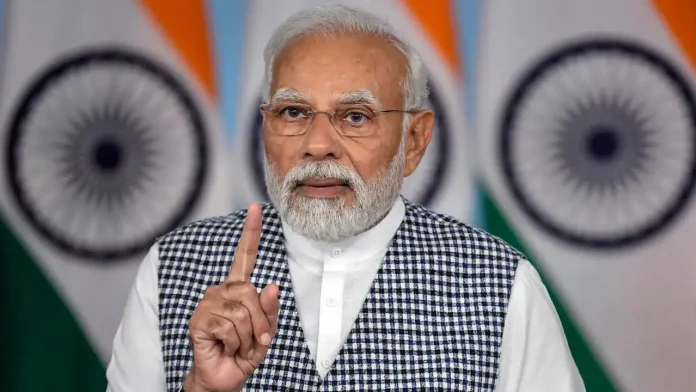On June 25, 2025, marking the 50th anniversary of India’s Emergency, Prime Minister Narendra Modi unveiled The Emergency Diaries:
Years That Forged a Leader, a book that recounts his role as a young RSS pracharak during the tumultuous period of 1975–77.
Published by BlueKraft Digital Foundation and launched by Union Home Minister Amit Shah, the book offers a vivid account of Modi’s covert resistance against the authoritarian regime of Indira Gandhi.
Described as a tribute to the unsung heroes of the anti-Emergency movement, it sheds light on a defining chapter in Modi’s life and India’s democratic history.
This article explores the book’s significance, Modi’s contributions, and the enduring lessons of the Emergency.
- Book Release: The Emergency Diaries was launched on June 25, 2025, by Amit Shah, commemorating 50 years since the Emergency’s imposition.
- Modi’s Role: As a young RSS pracharak, Modi organized underground resistance, distributed banned literature, and evaded authorities using disguises.
- Historical Context: The book details the Emergency’s impact, including censorship, mass arrests, and the suspension of constitutional rights.
- Personal Narratives: It includes first-hand accounts from Modi’s associates and archival materials, offering a unique perspective on his formative years.
- Democratic Legacy: The book underscores the importance of safeguarding democracy and Modi’s lifelong commitment to constitutional values.
The Emergency: A Dark Chapter in Indian History
The Emergency, declared by Prime Minister Indira Gandhi on June 25, 1975, remains one of the most controversial periods in Indian history.
Triggered by the Allahabad High Court’s ruling that disqualified Gandhi from her Rae Bareli seat, the Emergency lasted 21 months until March 21, 1977.
Citing “internal unrest,” the Congress-led government suspended fundamental rights, imposed press censorship, and arrested thousands of opposition leaders, activists, and students under Article 352.
The 42nd Amendment, which curtailed judicial independence, was later dubbed a “prime example of Congress’s shenanigans” by Modi.
The period saw widespread fear, with the government cracking down on dissent and stifling democratic institutions. The anti-Emergency movement, led by figures like Jayaprakash Narayan and supported by young activists like Modi,
became a beacon of resistance, ultimately forcing the government to restore democracy and hold elections in 1977, which Congress lost decisively.
The Emergency Diaries: A Window into Modi’s Early Struggles
Published by BlueKraft Digital Foundation, The Emergency Diaries is a meticulously crafted narrative that draws on first-hand accounts, archival materials, and Modi’s own memoir, Sangharsh Ma Gujarat.
The book, featuring a foreword by former Prime Minister H.D. Deve Gowda, a stalwart of the anti-Emergency movement, paints a vivid picture of Modi’s role as a young RSS pracharak.
It highlights his ingenuity, courage, and commitment to democratic ideals during a time of state repression.
Modi, then in his mid-20s, was a key figure in the Rashtriya Swayamsevak Sangh’s (RSS) underground operations in Gujarat.
Despite the RSS being banned, he coordinated covert activities, including secret meetings, distribution of anti-Emergency literature, and support for imprisoned activists.
The book reveals how Modi used disguises—posing as a Sikh, a priest, or even a “Swamiji”—to evade police surveillance. One notable anecdote describes Modi visiting a jail in 1976 disguised as a holy man to support jailed activists, showcasing his resourcefulness.
Modi’s Contributions to the Resistance
The Emergency Diaries details Modi’s multifaceted role in the anti-Emergency movement:
- Distributing Banned Literature: Modi devised innovative ways to disseminate anti-Emergency materials, using India’s railway network to avoid postal surveillance. He collaborated with senior RSS leaders like Nath Zagda and Vasant Gajendragadkar to send literature from Gujarat to other states, minimizing detection risks.
- Organizing Secret Meetings: Under code names like “Chandan ka Karyakram,” Modi planned clandestine gatherings at karyakartas’ homes, ensuring escape strategies in case of police raids. His meticulous planning protected activists and sustained the movement.
- Supporting Activists: As a member of the Lok Sangharsh Samiti, Modi provided news and resources to Gujarat and beyond, often traveling in disguise to maintain communication networks.
- Raising Awareness: The book recounts how Modi and his associates printed and distributed materials highlighting the Congress government’s excesses, keeping the democratic spirit alive despite censorship.
These efforts, as described by BlueKraft, were fraught with danger, with risks of arrest at every step. Yet, Modi’s resolve ensured the movement’s momentum, contributing to the eventual restoration of democracy.
Voices from the Era
The book includes compelling anecdotes from Modi’s associates. Rupchand Bhai Odermal Sevakani, a school principal in Panchmahal, Gujarat, recalls Modi’s role as a vibhag pracharak, maintaining RSS networks despite the ban.
Prakash Mehta, a Sangh worker now in Australia, recounts Modi arriving at his home disguised as a Swamiji, fooling locals who sought blessings.
Nagar Bhai Chavda describes the coded language used for secret meetings, underscoring Modi’s strategic foresight. These accounts, combined with archival records, offer a rare glimpse into the challenges and triumphs of the resistance.
Modi’s Reflections
In a post on X, Modi described the Emergency as a “learning experience” that reaffirmed the vitality of preserving democracy.
He noted the book’s release brought back memories of working with people across the political spectrum, from socialists to Jana Sangh members.
Modi urged families affected by the Emergency to share their stories on social media to educate youth about the “shameful time” from 1975 to 1977, when press freedom was stifled, and opposition voices were silenced.
Modi also criticized the Congress party, calling June 25 “Samvidhan Hatya Divas” (Constitution Murder Day) and highlighting the 42nd Amendment’s assault on constitutional principles.
He saluted those who fought to restore democracy, emphasizing their collective struggle as a turning point in India’s history.
Significance of the Book
The Emergency Diaries is more than a personal memoir; it’s a historical document that captures the resilience of India’s democratic spirit. BlueKraft describes it as a “tribute to the grit and resolve of those who refused to be silenced.”
The book’s release, attended by Amit Shah, marks a milestone in documenting India’s democratic struggles, offering lessons for future generations.
The foreword by H.D. Deve Gowda adds gravitas, connecting Modi’s experiences to the broader anti-Emergency movement.
The book’s scholarly approach, blending personal anecdotes with archival evidence, creates a new narrative on Modi’s formative years, showing how they shaped his leadership and commitment to a “Viksit Bharat” (Developed India).
Broader Implications
The release of The Emergency Diaries coincides with renewed discussions on the Emergency’s legacy. Modi’s call to share experiences aims to keep the period’s lessons alive, particularly among youth unaware of its impact.
The book also subtly critiques the Congress party, reinforcing the BJP’s narrative of protecting democratic values.
However, some critics argue it may oversimplify the complex political dynamics of the time, focusing primarily on Modi’s role.
The Emergency’s lessons remain relevant in 2025, as debates on civil liberties and governance persist globally.
By highlighting Modi’s early struggles, the book underscores the importance of vigilance in safeguarding democratic institutions, a message that resonates in an era of political polarization.
Challenges and Criticisms
While The Emergency Diaries has been praised for its detailed accounts, some historians caution against viewing it as a comprehensive history of the Emergency.
The focus on Modi’s contributions, while compelling, may overshadow other leaders’ roles, such as Jayaprakash Narayan or Morarji Desai.
Additionally, the book’s release during an election year has sparked debates about its political timing, with opposition parties questioning its intent.
The Emergency Diaries: Years That Forged a Leader is a powerful testament to Narendra Modi’s early commitment to democracy during one of India’s darkest periods.
Through disguises, secret meetings, and relentless activism, Modi played a pivotal role in the anti-Emergency movement, shaping his vision for a democratic India.
Launched on the 50th anniversary of the Emergency, the book, supported by BlueKraft Digital Foundation and Amit Shah, serves as both a personal memoir and a call to remember the sacrifices of countless activists.
As India reflects on this turbulent chapter, The Emergency Diaries inspires a renewed commitment to protecting the values enshrined in the Constitution.

